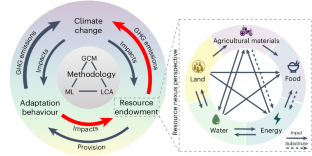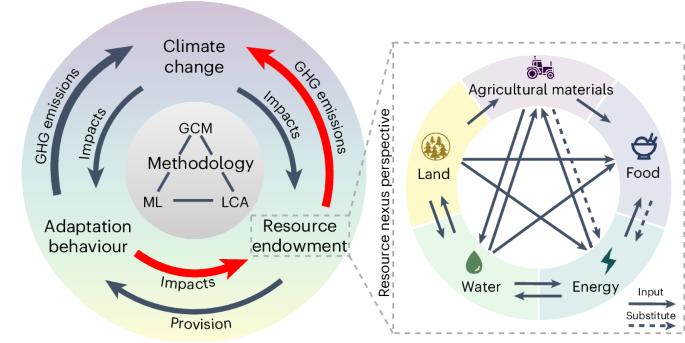Climate adaptation through crop migration requires a nexus perspective for environmental sustainability in the North China Plain
IF 23.6
Q1 FOOD SCIENCE & TECHNOLOGY
引用次数: 0
Abstract
Crop migration can moderate the impacts of global warming on crop production, but its feedback on the climate and environment remains unknown. Here we develop an integrated framework to capture the climate impacts and the feedback of adaptation behaviours with the land–water–energy–carbon nexus perspective and identify opportunities to achieve the synergies between climate adaptation and environmental sustainability. We apply the framework to assess wheat and maize migration in the North China Plain and show that adaptation through wheat migration could increase crop production by ~18.5% in the 2050s, but at the cost of disproportional increment in land use (~19.2%), water use (~20.2%), energy use (~19.5%) and carbon emissions (~19.9%). Irrigation and fertilization management are critical mitigation opportunities in the framework, through which wheat migration can be optimized to reduce the climatic and environmental impacts and avoid potential carbon leakage. Our work highlights the sustainable climate adaptation to mitigate negative environmental externalities. This study reveals that wheat migration as a strategy for climate adaptation lacks sustainability in the North China Plain. Irrigation and fertilization management provide mitigation opportunities to reduce negative environmental impacts and avoid carbon leakage.


华北平原通过作物迁移进行气候适应,需要从关系角度看待环境可持续性问题
作物迁移可以减缓全球变暖对作物生产的影响,但其对气候和环境的反馈作用仍是未知数。在此,我们建立了一个综合框架,从土地-水-能源-碳关系的角度来捕捉气候影响和适应行为的反馈,并找出实现气候适应和环境可持续性之间协同作用的机会。我们将该框架应用于评估华北平原的小麦和玉米迁移,结果表明,通过小麦迁移进行适应,可在 2050 年代将作物产量提高约 18.5%,但代价是土地使用(约 19.2%)、用水(约 20.2%)、能源使用(约 19.5%)和碳排放(约 19.9%)的不成比例增长。灌溉和施肥管理是该框架中至关重要的减缓机会,通过这些机会可以优化小麦迁移,从而减少对气候和环境的影响,并避免潜在的碳泄漏。我们的工作强调了可持续的气候适应,以减轻负面的环境外部效应。
本文章由计算机程序翻译,如有差异,请以英文原文为准。
求助全文
约1分钟内获得全文
求助全文

 求助内容:
求助内容: 应助结果提醒方式:
应助结果提醒方式:


